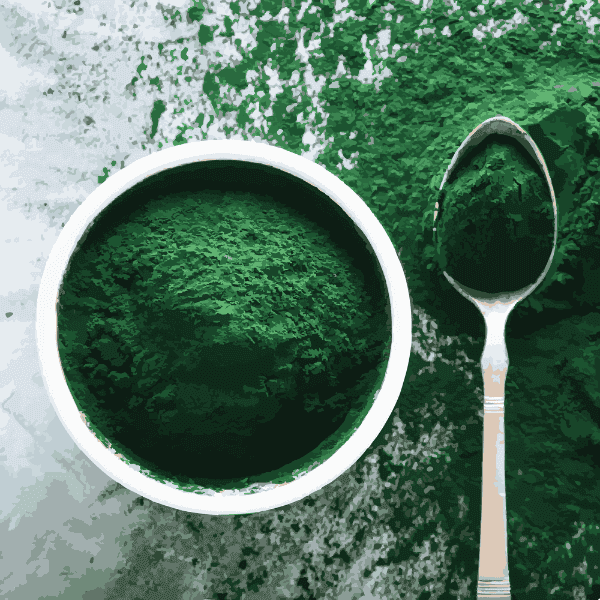
Spirulina powder {Organic}
Spirulina is a blue-green microalgae superfood found in fresh and saltwater. It is rich in vitamins and minerals, has anti-inflammatory properties, supports the immune system, supports digestion, and may improve energy levels. You can commonly find it in capsules, powders, teas, milk, soups, and smoothies.
You might need spirulina if . . .
Spirulina is a blue/green microalgae superfood from the Oscillatoriaceae family. Spirulina is found in fresh or saltwater clusters. Spirulina can grow in subtropical alkaline lakes and other forms of water with a temperature above 35 °C. There are about 15 species, and they’re usually rod- or disk-shaped. Spirulina’s main photosynthetic pigment is phycocyanin, which is how it gets its blue/green color and contains chlorophyll and carotenoids.
Spirulina may be a great choice if:
- You have low energy/ fatigue
- You want to improve your immune system
- You need a natural detoxifier
Benefits of Spirulina
- Anti-Inflammatory Properties
- Rich in Nutrients
- Antioxidant Properties
Common ways to use Spirulina
Spirulina is predominantly found in pills and powders.
Growing and Foraging Information
Spirulina is an aquatic product – like algae. Growing spirulina requires warm, sunny conditions and ensuring it comes from a very clean source, often grown in shallow ponds or tanks with a nutrient-rich environment. It is like algae. Growing spirulina requires warm, sunny conditions and a nutrient-rich environment. It is often grown in shallow ponds or tanks with a pH of around 10. Foraging for it could be tricky as it often thrives in alkaline saltwater lakes or ponds. Harvesting would need to be done very carefully to avoid contamination—ensuring it comes from a very clean source, often grown in shallow ponds or tanks with pH level of around 10. Foraging for it could be tricky as it often thrives in alkaline, saltwater lakes or ponds, and harvesting would need to be done very carefully to avoid contamination – making sure it's from a very clean source, or it could do more harm than good.
Safety Concerns
Drug Interaction: It may interact with certain medications, such as immunosuppressants, blood thinners, and diabetes meds. If you have any health concerns or are taking any prescription medication, please consult with your healthcare provider before adding new herbs to your diet.
Breastfeeding and Pregnancy: It is generally considered safe, but it is important to use caution and research the quality of the product before purchasing and ingesting.
Other Concerns: We recommend reviewing product COAs and ensuring that heavy metals (naturally occurring in nearly everything) fall within normal limits. With zero evidence of risks associated with spirulina during pregnancy or breastfeeding, it’s safe to say as long as spirulina has normal levels of heavy metals, it is a safe option for all stages of life.
Select Studies About Spirulina
Spirulina in Clinical Practice: Evidence-Based Human Applications
Spirulina shows promise in treating allergic rhinitis and lowering cholesterol, but more research is needed to confirm these benefits. While it's generally considered a safe supplement, its potential as a treatment for cancer, chronic fatigue, or viral infections is still unclear and requires further study.